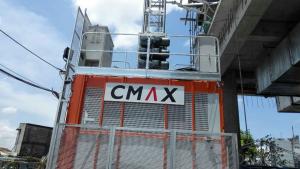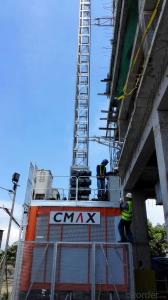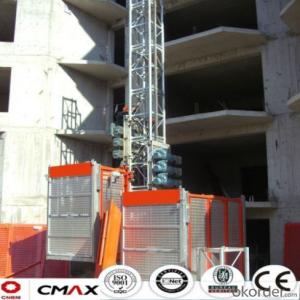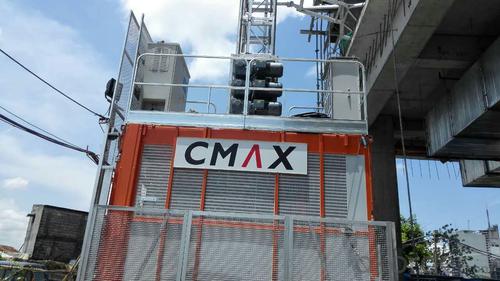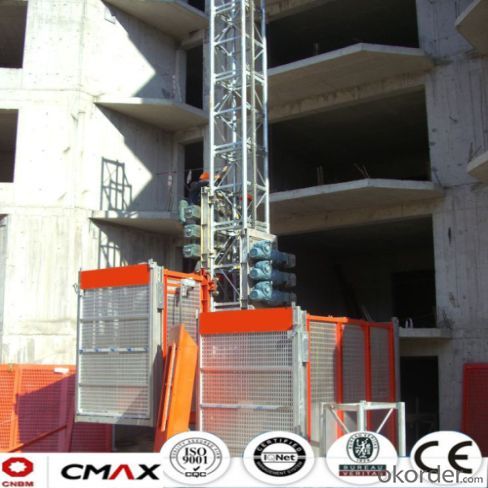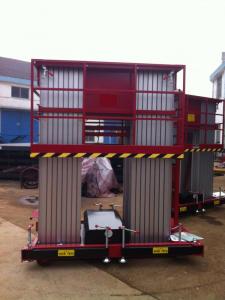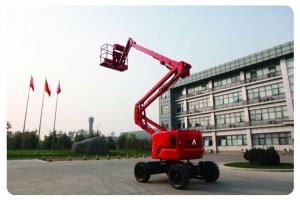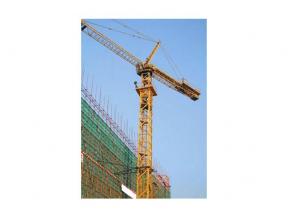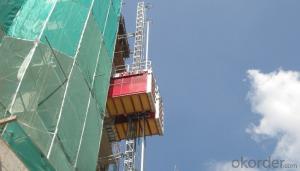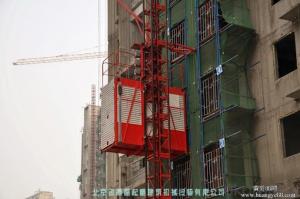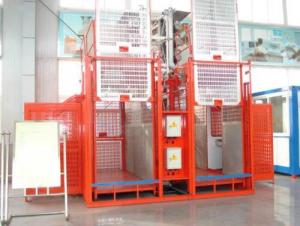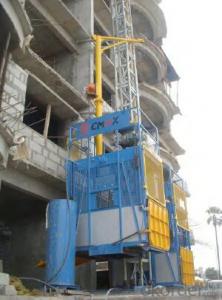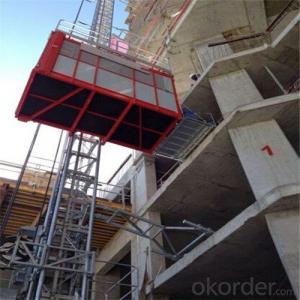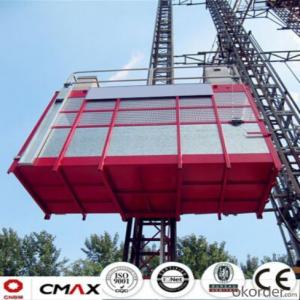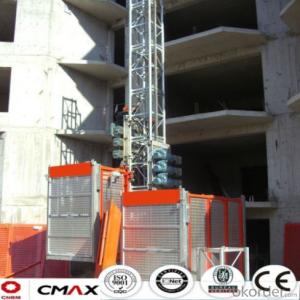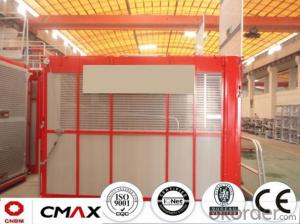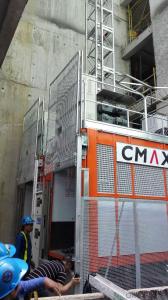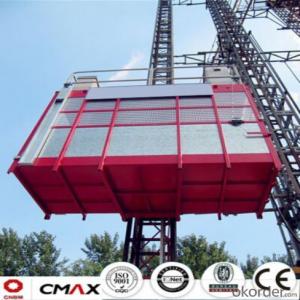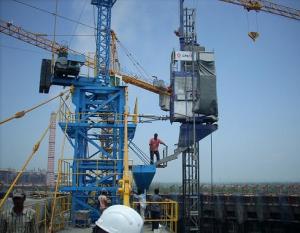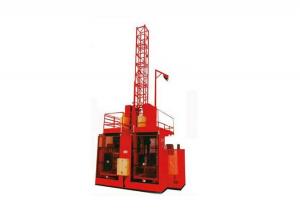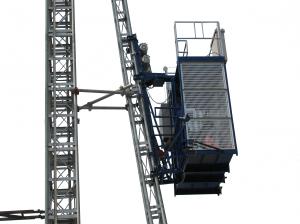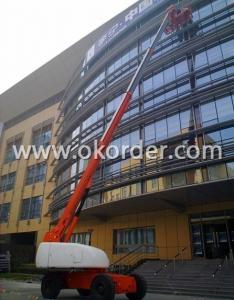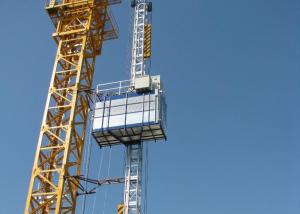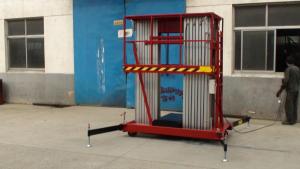Building Hoist European Standard With 2ton Electric Part
- Loading Port:
- China main port
- Payment Terms:
- TT OR LC
- Min Order Qty:
- 1 set
- Supply Capability:
- 10 set/month
OKorder Service Pledge
OKorder Financial Service
You Might Also Like
Specification
Structure of Building Hoist Description
1.The gearing select perfect bearing,strong cables and oil seal.
2.The electrical parts select products from famous world manufacturers for example Schneider,Siemens and LG.
3.The racks and pinion select advanced material and advanced technique,which enhance the life of all parts.
4.The steel structure adopted strong steel from famous native manufacturers.
Packaging & Delivery of Building Hoist
Packaging: nude and wooded box Delivery: 25-30days
Mains Parts of Building Hoist
1.The steel structure for example the mast, tie in and cabin ,could be all spay-painted and hot galvanized. Mast section is made with high quality Q345B which is the top standared in China.
2.Electrical parts are all adopted with Schneider , Siemens and other famous brands.
3.The electrical system can be selected with the normal control method and VVVF+PLC control way. Inverter we selected is from Schneider. Yaskawa or other world renowned brand.
4.Cabin exit door select ramping type. The ramping door looks like a bridge between the construction hoist and construction building.
5.The cabin floor is made from 3MM thickness steel riffled board(Hot dip galvanized), and 15MM thickness wooden board which can reduce the vibration and deformation a lot.
Building Hoist Images
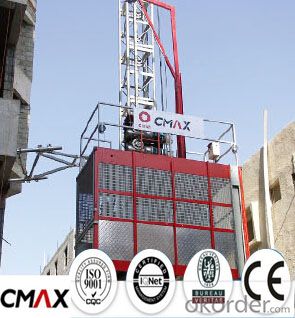
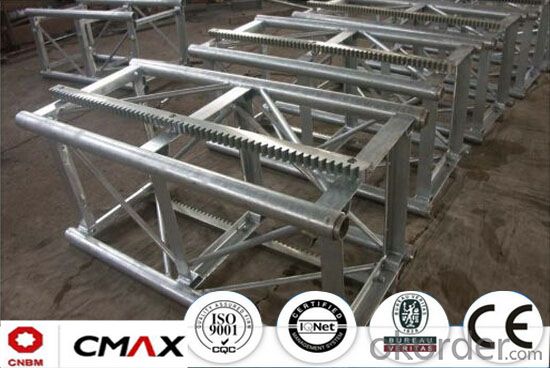
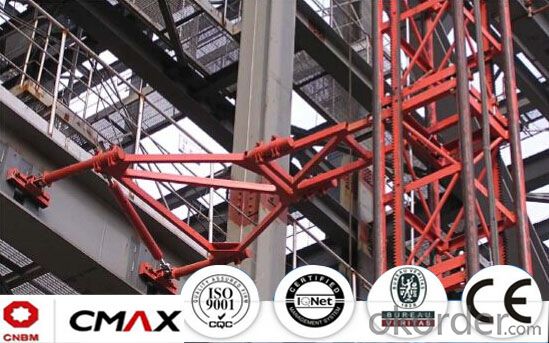
Building Hoist Specification
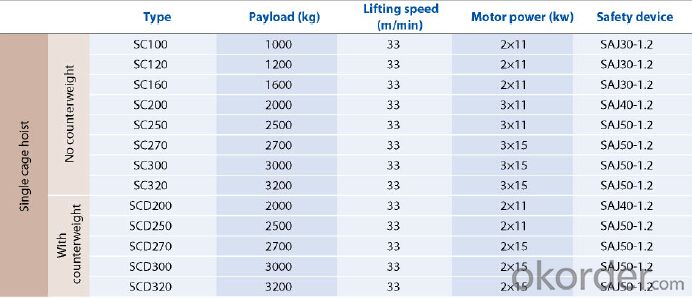
FAQ of Building Hosit
Q: What is the building hoist main purpose?
A: Building hoist equipped with double or single cabin to transport the materials and labors up and down. It's the ideal construction equipment for vertical transportation in the field of construction.
Q: What is the main structure of building hoist?
A: The P/M construction hoist mainly contains metal structure, driving system, electrical control system, cable guide & protection system, electrical top crane and safety device.
Q: What is the meaning of the building hoist’s code?
A: Take SC200/200 for example: “SC” stands for rack and pinion hoist, “200/200” stands for double cage and capacity is 2 tons per cage. “SC200” stands for single cage and capacity is 2 tons.
- Q: Is it possible to utilize building hoists in environments with high altitudes?
- <p>Yes, building hoists can be used in high-altitude environments, but their performance may be affected. At high altitudes, reduced air density can lead to decreased efficiency in hoist operations, particularly those powered by combustion engines. It's crucial to select hoists designed for high-altitude use, which may include features such as high-altitude ignition systems and special lubricants. Additionally, regular maintenance and adjustments to the hoist's operation parameters are necessary to ensure safety and optimal performance.</p>
- Q: This question asks for measures to protect lifting equipment from damage during its operation.
- <p>To prevent damage to lifting equipment during operation, ensure regular maintenance and inspection are conducted to check for wear and tear. Adhere to the equipment's load limits and never exceed them. Use appropriate lifting techniques and ensure the load is balanced. Keep the equipment clean and free from debris. Train operators thoroughly on safe operating procedures. Avoid sudden starts or stops, and ensure all safety features and guards are in place and functioning correctly. Regularly check cables, hooks, and other critical components for any signs of damage. Always follow the manufacturer's guidelines and industry safety standards.</p>
- Q: What is the main function of the construction elevator safety guard
- For safety device of construction hoist main effect is in the process of elevator used in times of emergency power, hit the brakes, let hoisting cage security attached on the guide rail frame, prevent the hoisting cage falling!
- Q: This question asks for examples of typical uses for building hoists, which are devices used to lift materials in construction settings.
- <p>Building hoists are commonly used in various construction applications. They are utilized for lifting and lowering materials and personnel in high-rise construction projects. Some examples include: 1) Lifting building materials such as bricks, cement, and steel beams to different floors of a building under construction. 2) Transporting workers to elevated work areas for tasks like scaffolding assembly or window installation. 3) Moving heavy equipment to upper levels of a structure. 4) Assisting in the installation of large fixtures like HVAC systems or electrical wiring systems. 5) Facilitating the removal of construction waste from upper floors. These applications highlight the versatility and efficiency of building hoists in construction projects.</p>
- Q: This question asks for an identification of the various types of lifting equipment that are specifically utilized in the context of building hoists.
- <p>Different types of lifting equipment used for building hoists include: 1. Electric Chain Hoists, which are versatile and suitable for various lifting tasks. 2. Manual Chain Hoists, that require manual operation and are used for lighter loads. 3. Electric Wire Rope Hoists, known for their high lifting capacity and durability. 4. Air Hoists, which are powered by compressed air and are ideal for environments where electricity is hazardous. 5. Geared Winches, used for pulling or lifting heavy loads with precision. 6. Jib Cranes, which provide a fixed or semi-fixed lifting solution in workshops. 7. Gantry Cranes, used for lifting heavy loads over a specific area. Each type serves specific purposes and is chosen based on the weight, environment, and specific requirements of the construction project.</p>
- Q: Are there any good signs in the construction elevator door
- Referring to the unified code of construction safety technology of GB 50870-2013, and the construction safety inspection standard JGJ59-2011
- Q: This question inquires about the cost of a hydraulic building hoist.
- <p>The cost of a hydraulic building hoist can vary significantly depending on factors such as capacity, brand, features, and new or used condition. Prices typically range from a few thousand dollars for smaller, basic models to tens of thousands for larger, more advanced units. For a precise quote, it's best to contact manufacturers or suppliers with specific requirements, as costs can fluctuate based on the model and market conditions. It's also advisable to consider ongoing maintenance and operational costs when budgeting for a hydraulic building hoist.</p>
- Q: Is it feasible to utilize a building hoist for lifting heavy objects when the ground is not level?
- <p>A building hoist is generally designed for vertical lifting in a stable and level environment. Using it on uneven ground can be hazardous and is not recommended due to the risk of tipping or instability. For lifting heavy objects on uneven ground, it's advisable to use specialized equipment like mobile cranes or all-terrain forklifts that are designed to handle such conditions. Always consult the manufacturer's guidelines and safety regulations before using any lifting equipment.</p>
- Q: This question asks whether a building hoist can be utilized to lift various objects with differing weights and dimensions.
- <p>Yes, building hoists are designed to lift a variety of objects with different weights and sizes. They are versatile and adjustable, allowing for the transportation of materials such as bricks, concrete, and equipment. However, each hoist has a specific weight capacity that must not be exceeded. It's crucial to ensure that the objects being lifted are within the hoist's capacity and that the hoist is properly configured for the size and shape of the objects to ensure safety and efficiency.</p>
- Q: Helped wall bar how to set up, and several layers of set a, two width, wall rod need a few meters long, what shape is the embedded parts, how much of a steel bar, Angle and wall vertical or have?
- According to drawings, find the embedded at the scene near the level of architectural axis positioning and high elevation line (50 wire or 1 m wire) location and double-check, axis dividing levels as much as possible in accordance with the size distribution. Find out after each axis, measuring building contour, and map measure the buildings, and building construction drawing contrast, timely transfer measurement results to the designer, designer analyze the error and make changes
Send your message to us
Building Hoist European Standard With 2ton Electric Part
- Loading Port:
- China main port
- Payment Terms:
- TT OR LC
- Min Order Qty:
- 1 set
- Supply Capability:
- 10 set/month
OKorder Service Pledge
OKorder Financial Service
Similar products
Hot products
Hot Searches
Related keywords
